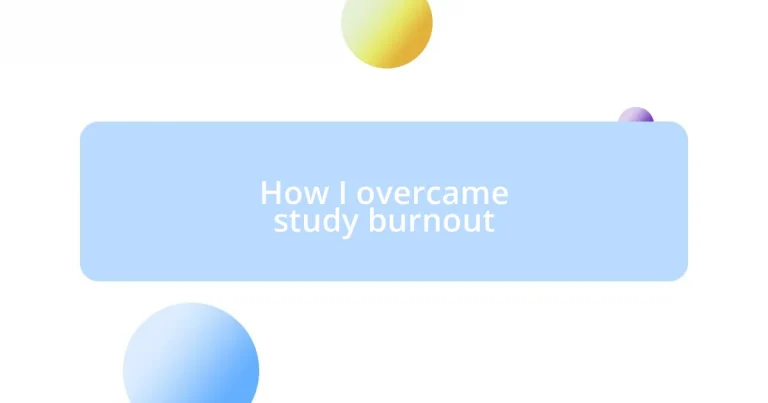Key takeaways:
- Study burnout can lead to emotional tolls like anxiety and self-doubt, manifested through lack of motivation and declining academic performance.
- Key causes of study burnout include unrealistic goals, poor time management, lack of support, and overcommitment.
- Effective strategies for preventing burnout involve establishing a realistic study schedule, prioritizing self-care, and seeking support from peers.
- Long-term study health is maintained by creating a personalized study environment, regularly reassessing goals, and connecting with a support network.
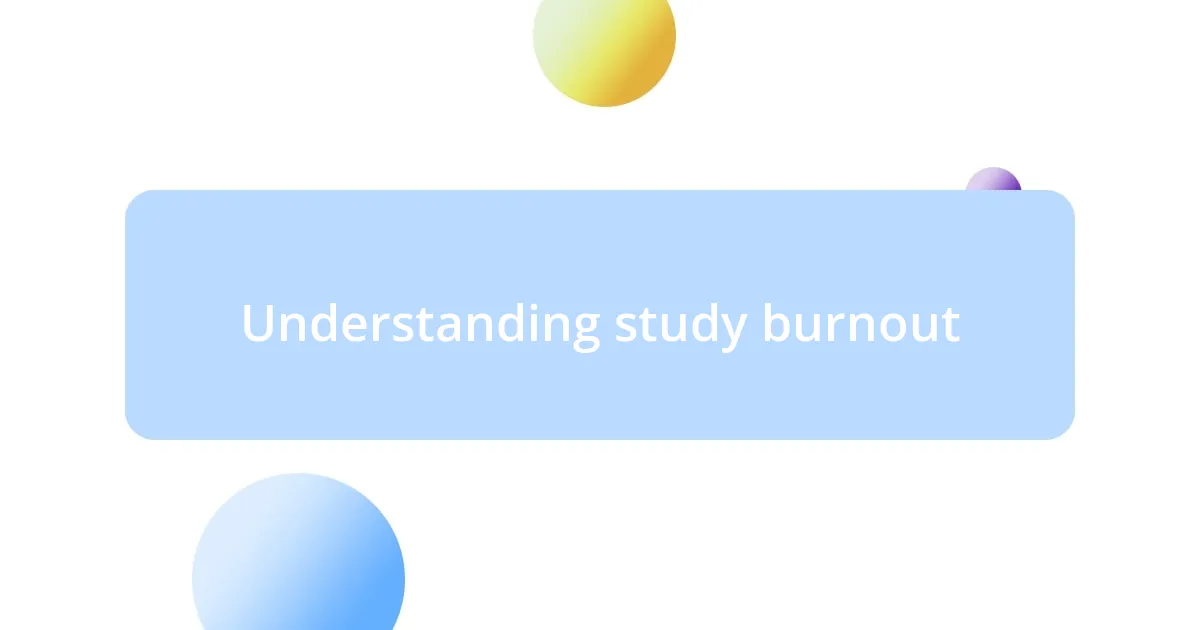
Understanding study burnout
Study burnout, in my experience, can creep up on even the most dedicated students. I’ve felt that all-consuming fatigue and dread when faced with endless assignments and looming deadlines. Have you ever sat down to study, only to find yourself staring blankly at the page, feeling utterly drained? That’s a clear sign that burnout has set in.
One of the most profound moments for me was when I realized I was losing my passion for learning. I used to devour textbooks and engage deeply with my subjects, but burnout drained that joy away, leaving me with a sense of emptiness. This erosion of interest often comes with feelings of isolation—do you ever feel like you’re the only one struggling while everyone else seems to thrive?
It’s not just about fatigue; study burnout manifests emotionally, often leading to anxiety and self-doubt. I remember questioning my abilities, wondering if I was cut out for my chosen path. How many of us have grappled with those thoughts? Understanding this emotional toll is crucial; recognizing that burnout is more than just being tired helps us to address the root causes and begin to find a way out.
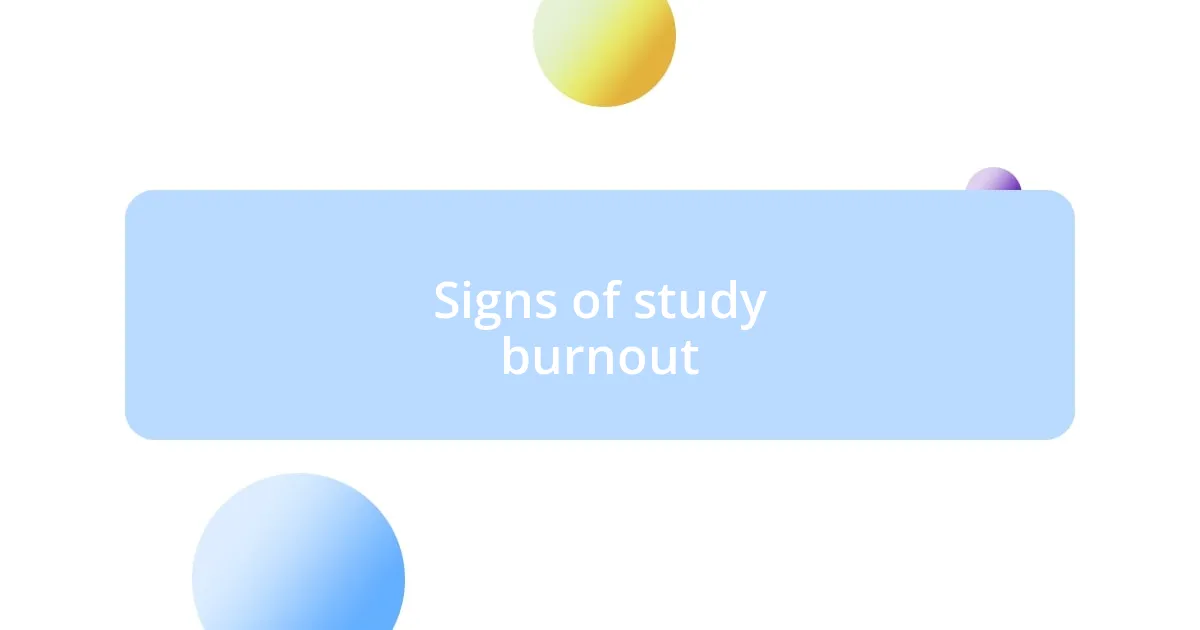
Signs of study burnout
Recognizing the signs of study burnout is vital for managing it effectively. One major indicator is a consistent lack of motivation. I remember vividly when I’d wake up and dread opening my books. It felt like I was dragging myself through molasses, and the idea of studying felt more like a chore than anything else. Have you experienced that sluggish feeling? That’s a clear red flag.
Another sign is the decline in academic performance. I once scored lower than I was used to, despite putting in the same amount of effort. It was disheartening, and it only fed my anxiety, creating a vicious cycle. You might notice similar dips in your grades or even struggle to grasp concepts you once understood easily. This change can signal that the burnout is affecting your cognitive abilities.
Finally, physical symptoms like headaches or insomnia can point to study burnout. I often found myself exhausted but unable to sleep, my mind racing with thoughts about assignments and exams. This physical toll is often overlooked but can be a significant part of the burnout experience. Have you felt that tension in your body, pleading for a break? It’s crucial to listen to those signals.
| Signs of Study Burnout | Personal Experience |
|---|---|
| Lack of Motivation | Waking up dreading study time, feeling sluggish. |
| Decline in Academic Performance | Experiencing lower grades despite the same effort in studying. |
| Physical Symptoms | Struggling with headaches and insomnia, feeling exhausted yet restless. |
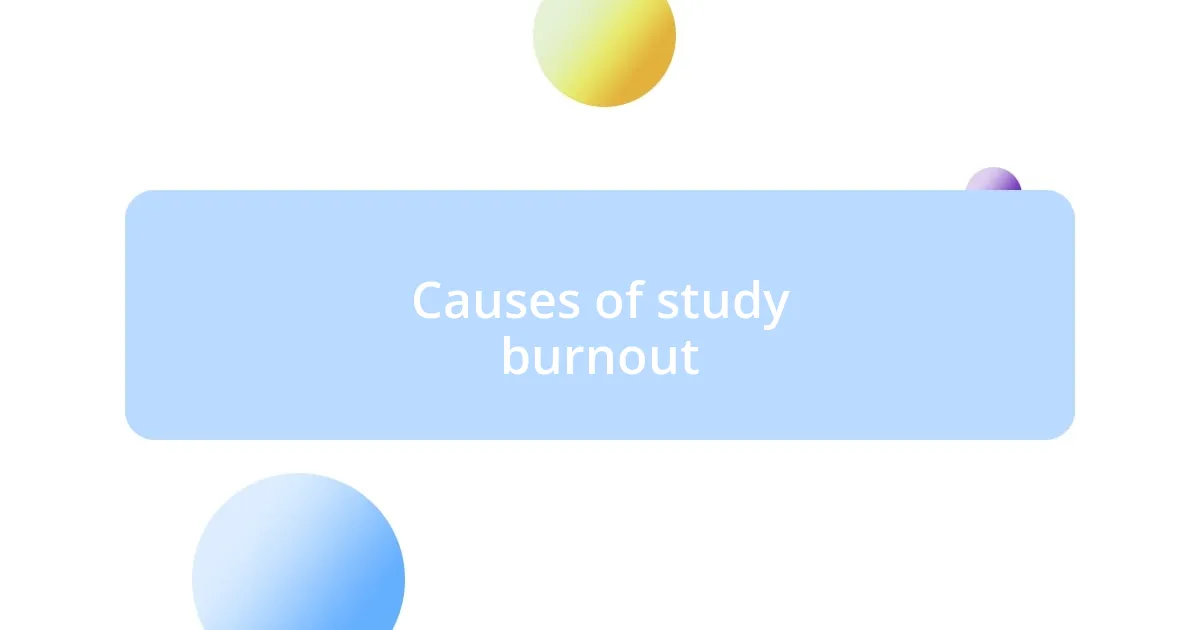
Causes of study burnout
Study burnout can often be traced back to a combination of overwhelming expectations and poor time management. I’ve found that when I set unrealistic goals for myself—like cramming for exams last minute—I’m setting the stage for an emotional and mental breakdown. It’s like trying to balance too many plates; eventually, something will crash. A lack of breaks and constant pressure can turn studying, which should be an enriching experience, into a source of dread.
Here are some key causes I’ve identified:
– Unrealistic Goals: Setting high expectations can lead to feelings of inadequacy.
– Poor Time Management: Procrastination often exacerbates feelings of stress and chaos.
– Lack of Support: Isolation makes it harder to cope with academic pressures.
– Overcommitment: Juggling too many responsibilities can overwhelm even the most resilient students.
I still remember a time when I struggled to keep up with multiple club commitments while managing a full course load. My passion for my studies dwindled as I felt stretched too thin. Recognizing these causes is the first step toward reclaiming your academic journey and preventing burnout before it spirals out of control.
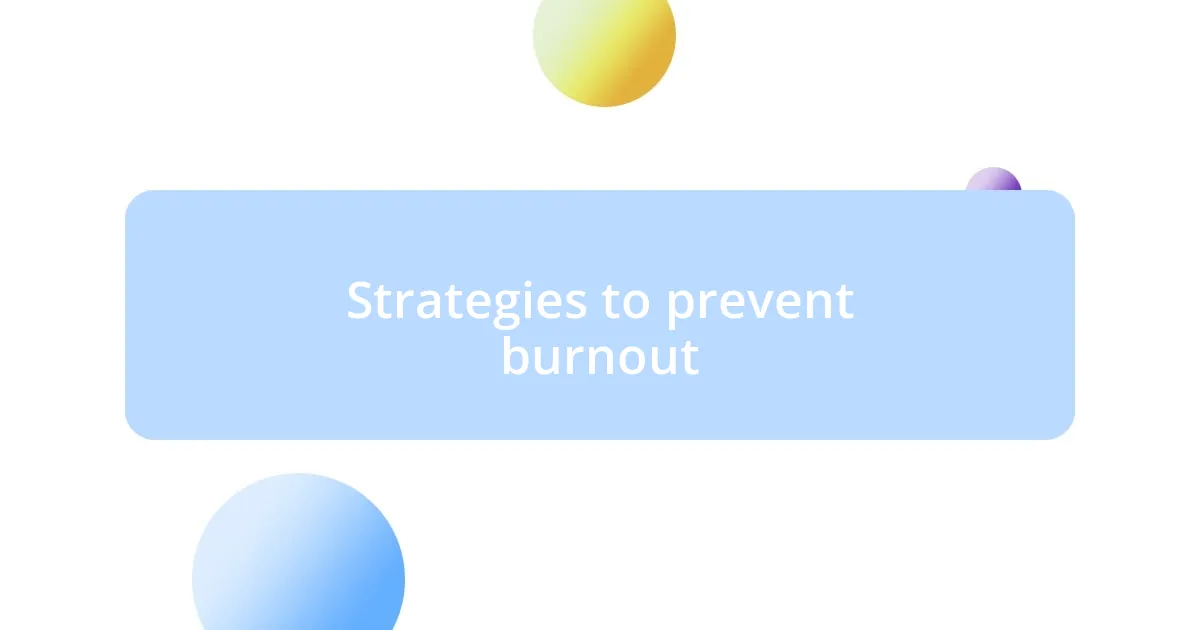
Strategies to prevent burnout
One of the most effective strategies I found for preventing burnout was establishing a realistic study schedule. I began to dedicate specific time blocks for studying, but I also made sure to include breaks. Have you ever noticed how a short walk or a five-minute stretch can rejuvenate your focus? I would often return to my books feeling refreshed and ready to tackle even the toughest material. This simple adjustment not only enhanced my productivity but also made studying feel less overwhelming.
In addition, I learned the importance of self-care. Initially, I often neglected my physical and mental health amid the pressure of academic deadlines. I started prioritizing activities I enjoy, like journaling or taking long walks in nature. Remember that time when you felt invigorated after a fun outing or a good night’s sleep? I realized that these moments of joy were essential for keeping my spirits high and preventing that dreaded burnout.
Lastly, seeking support from peers played a key role in my burnout prevention strategy. I joined study groups where we not only tackled problems together but also shared our feelings about stress and pressure. Don’t you think talking openly about our experiences makes them more manageable? This sense of community not only alleviated feelings of isolation but reminded me that I wasn’t alone in my struggles. It turned studying into a more collaborative and enjoyable experience, transforming a solitary task into a supportive journey.
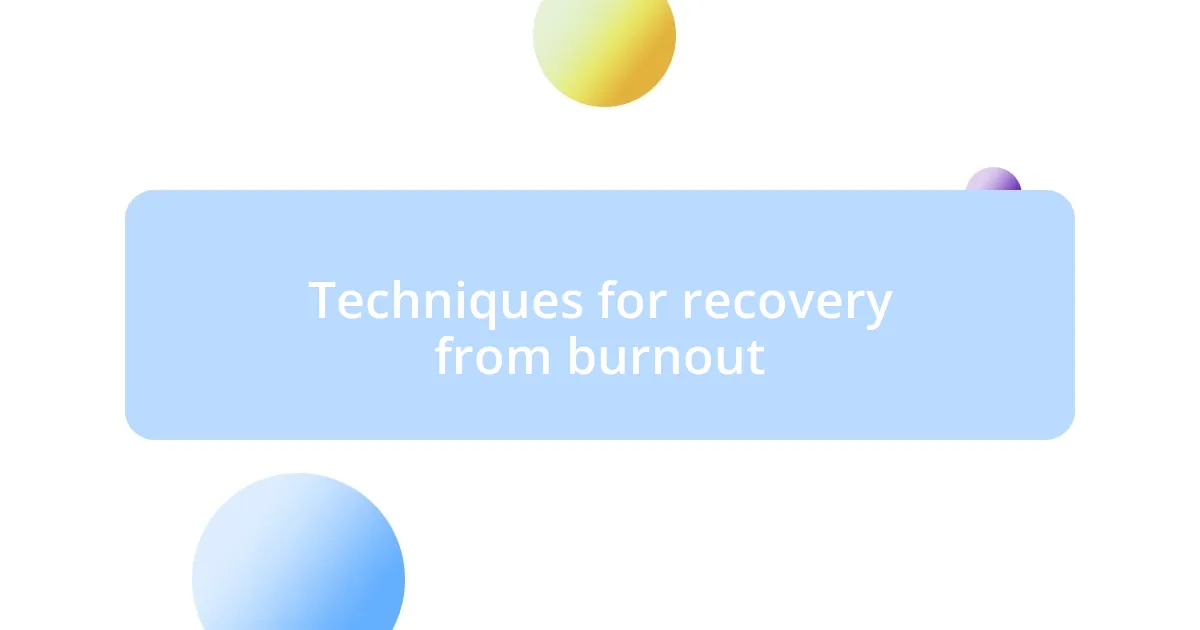
Techniques for recovery from burnout
Finding effective techniques for recovery from burnout is essential for regaining my balance. One approach that worked wonders for me was practicing mindfulness. I recall sitting quietly in my room, focusing solely on my breath. This simple practice felt like hitting a reset button on my mind. Have you ever taken a moment to pause and truly tune in to your thoughts? This exercise helped me create a more peaceful internal environment, allowing stress to melt away and my focus to sharpen.
Another technique I embraced was setting boundaries around my study time. Initially, I would study late into the night, expecting my brain to function like a machine. However, I discovered that establishing clear cut-off times for studying led to better rest and an improved mood. I remember how I used to feel panic creeping in around bedtime, but once I committed to finishing my work during the daytime hours, I found that my evenings transformed into cherished free time. Isn’t it amazing how creating time for ourselves can reinvigorate our passion for learning?
Lastly, I found journaling to be a therapeutic outlet that helped me process my feelings and reflect on my experiences. There were days when the weight of academic pressure felt overwhelming, and just putting pen to paper allowed me to unload those burdens. I often posed questions to myself about my goals and motivations; for instance, “What truly drives me?” Engaging in this self-reflection opened my eyes to my genuine interests and passions rather than just the expectations placed on me. Wouldn’t it be great if more students took time to unravel their thoughts like this? It was through this process that I began to reclaim my academic journey and rediscover the joy of learning.
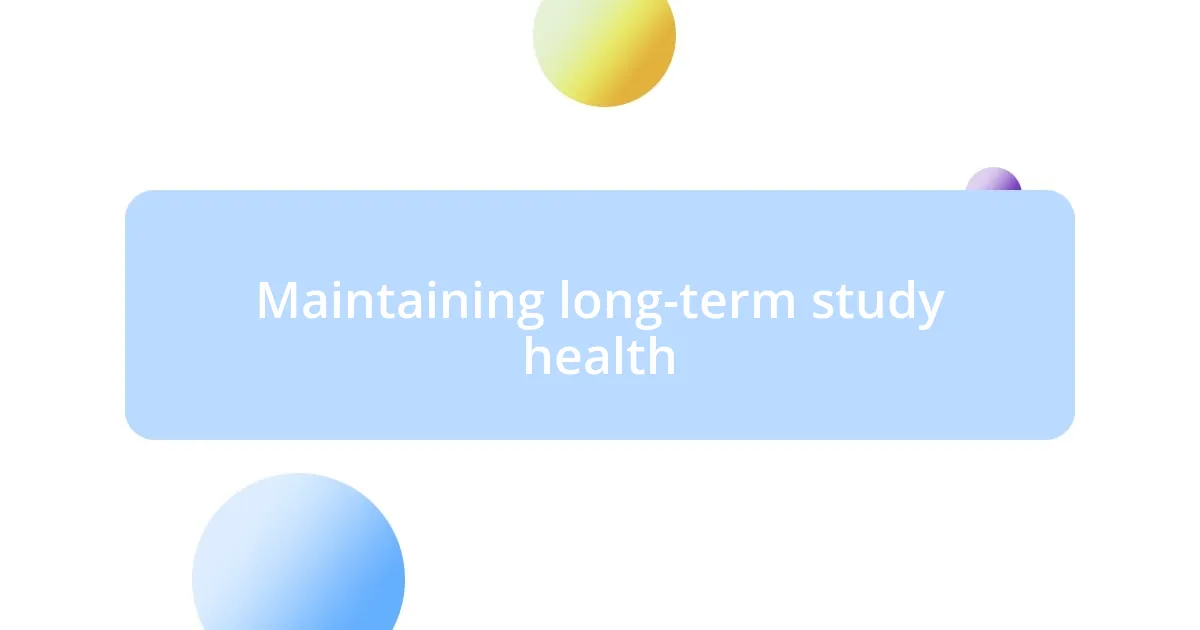
Maintaining long-term study health
Maintaining long-term study health requires a proactive approach to balance and well-being. Personally, I found that creating a personalized study environment was crucial. I experimented with different lighting and background music, eventually discovering that a comfortable chair and soft instrumental music drastically improved my concentration. Have you ever noticed how your surroundings can influence your mood? Taking the time to set up a dedicated study space made my sessions more enjoyable and productive.
Regularly reassessing my goals played a significant role in sustaining my motivation. I would sit down every couple of weeks to reflect on what I truly wanted to achieve. It’s surprising how often we can lose sight of our initial aspirations amid day-to-day grind. I realized that adapting my goals to align with my evolving interests kept my study sessions fresh and engaging, making sure they didn’t feel like a chore but rather a stepping stone to my future.
Lastly, the importance of connecting with a support network cannot be overstated. I began reaching out not only to friends but also to academic advisors and mentors. Engaging in meaningful conversations about my struggles helped me view challenges from different perspectives. Can you recall a moment when someone’s insight shifted your understanding? For me, these interactions offered a gentle reminder that we don’t have to navigate our academic journeys alone. They reignited my passion for learning and reminded me that it was okay to ask for help along the way.
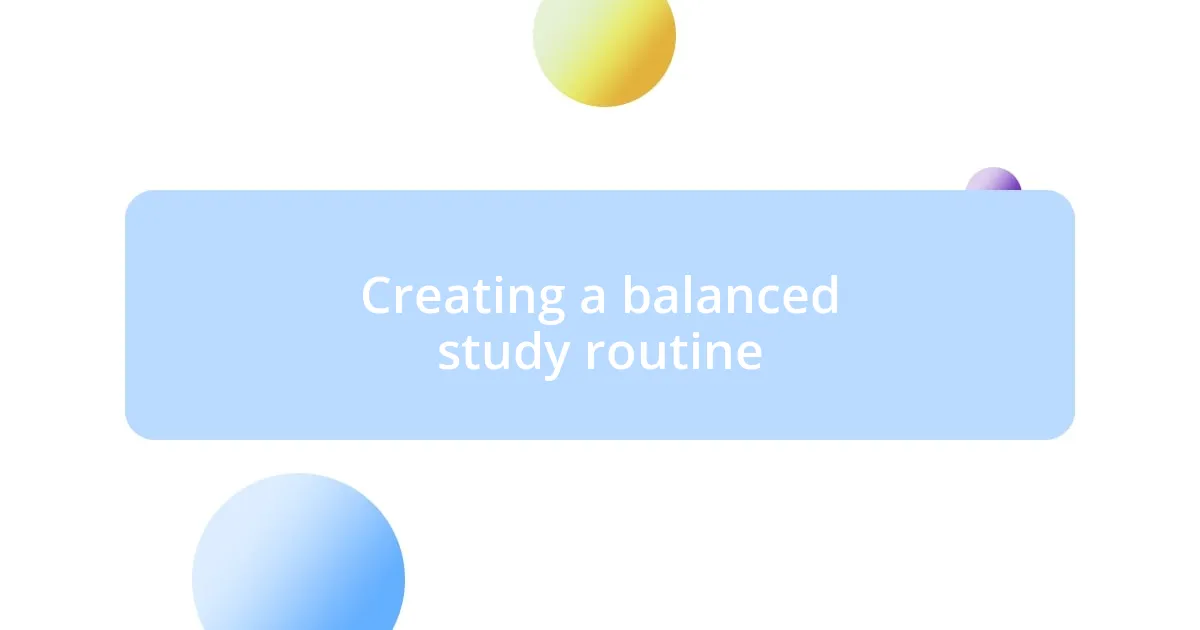
Creating a balanced study routine
Creating a balanced study routine has been a game changer in my academic life. I remember the chaos of cramming for exams, feeling stressed and overwhelmed. After realizing that this approach wasn’t sustainable, I crafted a study schedule that allocated specific time slots for different subjects. Have you ever tried breaking your study block into manageable chunks? This strategy not only alleviated my pressure but also allowed me to engage with each topic deeply and effectively.
I also learned the value of incorporating breaks into my routine. Initially, I’d power through long sessions without pause, thinking it was the best way to maximize my study time. However, I soon discovered that taking short breaks rejuvenated my mind. I fondly recall stepping outside for a brief walk, enjoying the fresh air and letting my thoughts wander. How refreshing it feels to step away from books for just a moment! Those little intermissions helped reset my focus, making my study sessions feel less like a marathon.
Additionally, I found joy in mixing up my study methods. At first, I primarily relied on reading and note-taking, which became monotonous over time. So, I began incorporating interactive techniques like flashcards and group discussions. I vividly remember a late-night study session with friends where we transformed complex concepts into fun quizzes. The laughter and collective problem-solving were invigorating! Isn’t it incredible how collaborating with others can turn studying from a solitary task into a shared adventure? This balance of techniques kept me motivated and eager to learn, ultimately leading to a richer understanding of the material.












